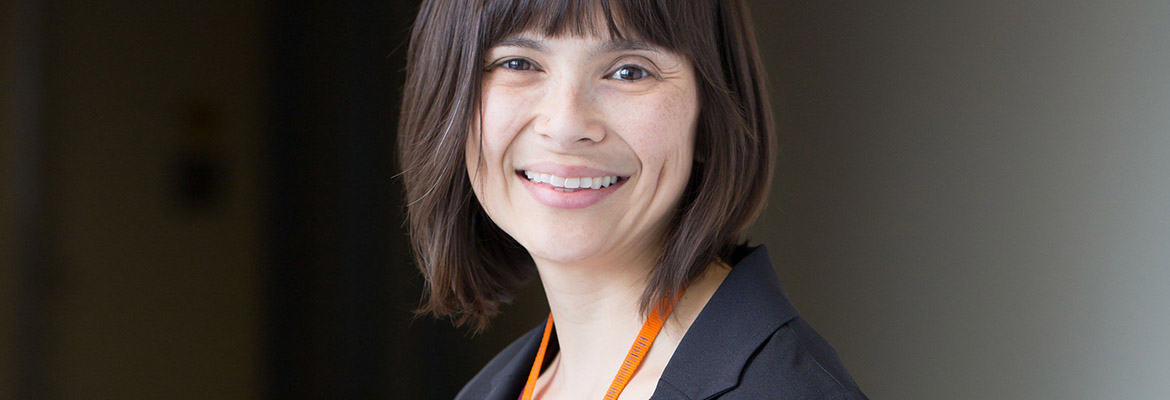Meet our Postdoctoral Scholars
Katie Mah, PhD
Katie Mah is an outstanding and accomplished critical scholar and occupational therapist. She is deeply committed to improving health services and supports for young people experiencing concussion and has already made a significant impact in her field, and to childhood rehabilitation and research more broadly. We are thrilled to have her join our team in the School of Occupational Therapy; Katie embodies the core values and social vision of occupational therapy and radiates a positive influence in all her research, teaching, mentorship and service endeavors.
-- School of Occupational Therapy professor Gail Teachman, Supervisor
We asked Katie a few questions as an introduction to her research.
How would you describe your current or upcoming research projects?
Responses to what has been termed the ‘crisis’ of youth concussion include legislative and policy initiatives, and the development of resources to enable concussion recovery. Despite the prioritization of paths to recovery across sectors, recovery as a concept has rarely, if ever, been taken up and questioned in relation to youth concussion. Little attention has been directed toward understanding what recovery ‘is’ from the perspectives of young people experiencing concussion (e.g., what constitutes a ‘full’ or ‘good’ recovery, how young people understand their own recovery).
My upcoming study will engage young people with lived experience of concussion in the co-production of knowledge of concussion recovery. Using interviews and multimedia storytelling methods, and framed by philosopher Michel Foucault’s theorizations of knowledge, power, and discourse, this study will examine: (a) how recovery is conceptualized by young people with lived experience of concussion, (b) how young people negotiate and/or resist conventional, biomedically-based ways of thinking about recovery (e.g., recovery as cure), and (c) how young people’s understandings of concussion are shaped by and within the varied contexts of their lives (e.g., school, sport, family, media/social media, healthcare).
What inspired your interest in research, in general, and in your specific area?
My interest in research was inspired by my clinical background in nursing and occupational therapy. Throughout my academic and clinical training, I came to realize that the issues I encountered in practice, and the questions these issues provoked, were rarely examined in research in a way that spoke to my experience and worldview. I was intrigued by the person receiving care, rather than the ‘patient’ or ‘client’, by who they were within and beyond the clinic, and by the effect of healthcare practices on them.
My specific interest in youth concussion was inspired by my own lived experience with concussion, and by Dr. Nick Reed, my doctoral supervisor, Associate Professor (University of Toronto, Department of Occupational Science & Occupational Therapy), and Canada Research Chair (Tier 1) in Pediatric Concussion. Dr. Reed’s achievements in the field of youth concussion are many, but it was his passion for enabling young people to do the things they need, want, and love to do following concussion that drew me to pursue my doctoral research with him.
Now, or in the future, what will be the impact of your research?
My doctoral work was centrally concerned with examining how young people conceptualize concussion. My upcoming postdoctoral study expands the topic to consider how young people conceptualize concussion recovery. Together, my postdoctoral and doctoral work contribute nuanced understandings of youth concussion from young people themselves concerning their views on ‘what concussion is’, ‘what recovery is’, and ‘whose perspectives matter’. These views, and the experiential knowledge of young people, have been largely missing from discussions about youth concussion recovery across sectors.
By bringing forward knowledge produced in partnership with young people, my program of research broadens understandings of youth concussion and its effects on young Canadians, and has the potential to re-orient supports, services, research, and policy agendas in response to the expressed needs and priorities of this population.
What about Western University influenced your decision to do your research here?
Several factors influenced my decision to pursue my postdoctoral research at Western University. First and foremost was the opportunity to work with Dr. Gail Teachman (Assistant Professor, School of Occupational Therapy), a leader in childhood disability research and methodological innovation with expertise uniquely suited to my emerging program of research. Dr. Teachman is a generous scholar who is committed not only to supporting me in my postdoctoral research, but in preparing me for a successful and productive career in academia.
Secondly, through Dr. Teachman I am immersed in the talent and culture of the Childhood Research Ethics Disability Lab, where I am gaining invaluable mentorship experience within a community of support. Finally, I was drawn to Western University for its demonstrated commitment to promoting health and social equity and its established reputation as a world-class institution with an Area of Excellence in Concussion Research.
If you have been the recipient of any research awards, scholarships, etc., please list them and any impact they have had.
My first year of postdoctoral training has been supported through a FHS Postdoctoral Associate Recruitment Award held by Dr. Teachman. That funding has been integral to my success in securing a further two years of funding through the following:
- Mitacs Elevate Postdoctoral Fellowship (2022-24)
- Joan Eakin Award for Methodological Excellence in a Qualitative Doctoral Dissertation, University of Toronto Centre for Critical Qualitative Health Research (2020-21)
- Postdoctoral Trainee Award, Newton Foundation in association with McGill VOICE (Views on Interdisciplinary Childhood Ethics) (2020)
- Kimel Family Graduate Student Scholarship in Paediatric Rehabilitation (2016-17)
Additional Information
Education
- PhD in Rehabilitation Sciences Institute, (Univeristy of Toronto, 2020)
- MSc in Occupational Therapy (University of Toronto, 2011)
- BSc in Nursing (Western University, 2005)


